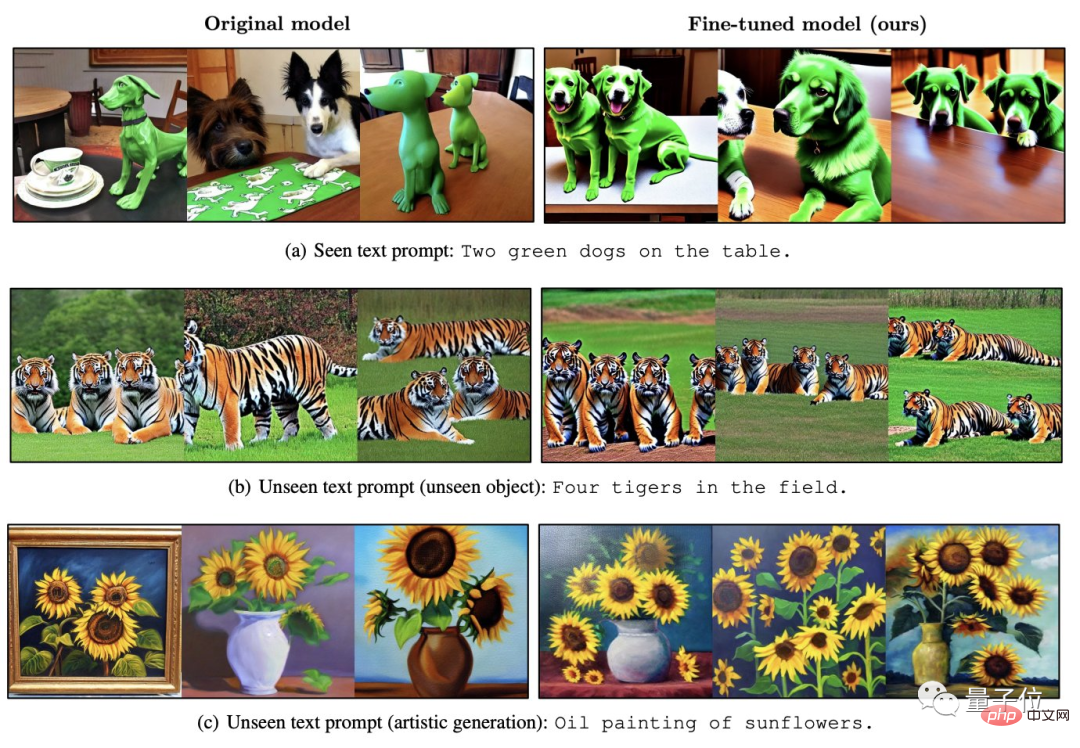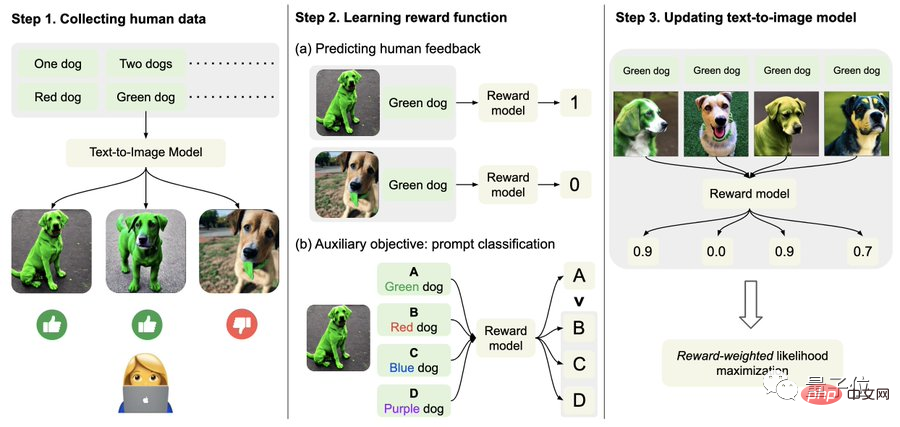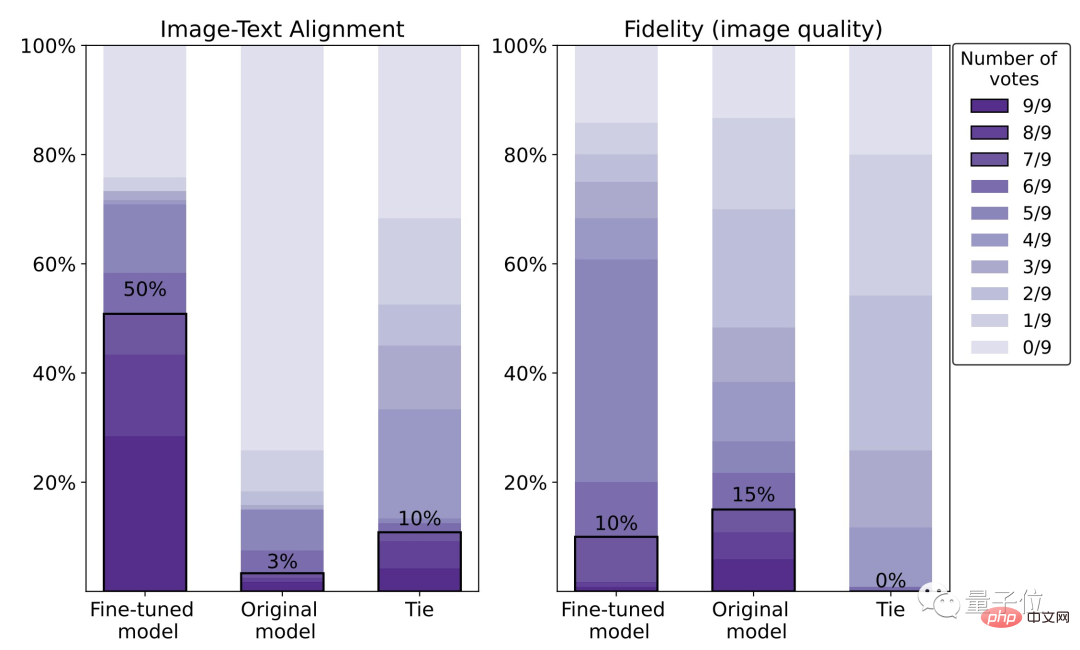 Technology peripherals
Technology peripherals
 AI
AI
 The core method of ChatGPT can be used for AI painting, and the effect soars by 47%. Corresponding author: has switched to OpenAI
The core method of ChatGPT can be used for AI painting, and the effect soars by 47%. Corresponding author: has switched to OpenAI
The core method of ChatGPT can be used for AI painting, and the effect soars by 47%. Corresponding author: has switched to OpenAI
There is such a core training method in ChatGPT called "Human Feedback Reinforcement Learning (RLHF)".
It can make the model safer and the output results more consistent with human intentions.
Now, researchers from Google Research and UC Berkeley have found that using this method in AI painting can "treat" the situation where the image does not completely match the input, and the effect is also surprisingly good——
Up to 47% improvement can be achieved.

△ The left is Stable Diffusion, the right is the improved effect
At this moment, the two popular models in the AIGC field seem to have found some kind of " resonance".
How to use RLHF for AI painting?
RLHF, the full name is "Reinforcement Learning from Human Feedback", is a reinforcement learning technology jointly developed by OpenAI and DeepMind in 2017.
As its name suggests, RLHF uses human evaluation of model output results (i.e. feedback) to directly optimize the model. In LLM, it can make "model values" more consistent with human values.
In the AI image generation model, it can fully align the generated image with the text prompt.
Specifically, first, collect human feedback data.
Here, the researchers generated a total of more than 27,000 "text-image pairs" and then asked some humans to score them.
For the sake of simplicity, text prompts only include the following four categories, related to quantity, color, background and blending options; human feedback is only divided into "good", "bad" and "don't know (skip)" ".

Secondly, learn the reward function.
This step is to use the data set composed of human evaluations just obtained to train a reward function, and then use this function to predict human satisfaction with the model output (red part of the formula).
In this way, the model knows how much its results match the text.

#In addition to the reward function, the author also proposes an auxiliary task (blue part of the formula).
That is, after the image generation is completed, the model will give a bunch of text, but only one of them is the original text, and let the reward model "check by itself" whether the image matches the text.
This reverse operation can make the effect "double insurance" (it can assist step 2 in the figure below to understand).

Finally, it’s fine-tuning.
That is, the text-image generation model is updated through reward-weighted likelihood maximization (the first item of the formula below).

#In order to avoid overfitting, the author minimized the NLL value (the second term of the formula) on the pre-training data set. This approach is similar to InstructionGPT (the "direct predecessor" of ChatGPT).
The effect increased by 47%, but the clarity dropped by 5%
As shown in the following series of effects, compared with the original Stable Diffusion, the model fine-tuned with RLHF can:
(1) Get "two" and "green" in the text more correctly;

(2) Will not ignore "sea" As a background requirement;
(3) If you want a red tiger, it can give a "redder" result.
Judging from the specific data, the human satisfaction level of the fine-tuned model is 50%, which is a 47% improvement compared to the original model (3%).
However, the price is a loss of 5% image clarity.

We can also clearly see from the picture below that the wolf on the right is obviously blurrier than the one on the left:
Yes Therefore, the authors suggest that the situation could be improved using larger human evaluation datasets and better optimization (RL) methods.
About the author
There are 9 authors in total for this article.

As a Google AI research scientist Kimin Lee, Ph.D. from Korea Institute of Science and Technology, postdoctoral research was carried out at UC Berkeley.

Three Chinese authors:
Liu Hao, a doctoral student at UC Berkeley, whose main research interest is feedback neural networks.
Du Yuqing is a PhD candidate at UC Berkeley. His main research direction is unsupervised reinforcement learning methods.
Shixiang Shane Gu (Gu Shixiang), the corresponding author, studied under Hinton, one of the three giants, for his undergraduate degree, and graduated from Cambridge University with his doctorate.

△ Gu Shixiang
It is worth mentioning that when writing this article, he was still a Googler, and now he has switched to OpenAI, where he directly reports to Report from the person in charge of ChatGPT.
Paper address:
https://arxiv.org/abs/2302.12192
Reference link: [1]https://www.php .cn/link/4d42d2f5010c1c13f23492a35645d6a7
[2]https://openai.com/blog/instruction-following/
The above is the detailed content of The core method of ChatGPT can be used for AI painting, and the effect soars by 47%. Corresponding author: has switched to OpenAI. For more information, please follow other related articles on the PHP Chinese website!

Hot AI Tools

Undresser.AI Undress
AI-powered app for creating realistic nude photos

AI Clothes Remover
Online AI tool for removing clothes from photos.

Undress AI Tool
Undress images for free

Clothoff.io
AI clothes remover

AI Hentai Generator
Generate AI Hentai for free.

Hot Article

Hot Tools

Notepad++7.3.1
Easy-to-use and free code editor

SublimeText3 Chinese version
Chinese version, very easy to use

Zend Studio 13.0.1
Powerful PHP integrated development environment

Dreamweaver CS6
Visual web development tools

SublimeText3 Mac version
God-level code editing software (SublimeText3)

Hot Topics
 1378
1378
 52
52
 How to configure Debian Apache log format
Apr 12, 2025 pm 11:30 PM
How to configure Debian Apache log format
Apr 12, 2025 pm 11:30 PM
This article describes how to customize Apache's log format on Debian systems. The following steps will guide you through the configuration process: Step 1: Access the Apache configuration file The main Apache configuration file of the Debian system is usually located in /etc/apache2/apache2.conf or /etc/apache2/httpd.conf. Open the configuration file with root permissions using the following command: sudonano/etc/apache2/apache2.conf or sudonano/etc/apache2/httpd.conf Step 2: Define custom log formats to find or
 How to implement file sorting by debian readdir
Apr 13, 2025 am 09:06 AM
How to implement file sorting by debian readdir
Apr 13, 2025 am 09:06 AM
In Debian systems, the readdir function is used to read directory contents, but the order in which it returns is not predefined. To sort files in a directory, you need to read all files first, and then sort them using the qsort function. The following code demonstrates how to sort directory files using readdir and qsort in Debian system: #include#include#include#include#include//Custom comparison function, used for qsortintcompare(constvoid*a,constvoid*b){returnstrcmp(*(
 How Tomcat logs help troubleshoot memory leaks
Apr 12, 2025 pm 11:42 PM
How Tomcat logs help troubleshoot memory leaks
Apr 12, 2025 pm 11:42 PM
Tomcat logs are the key to diagnosing memory leak problems. By analyzing Tomcat logs, you can gain insight into memory usage and garbage collection (GC) behavior, effectively locate and resolve memory leaks. Here is how to troubleshoot memory leaks using Tomcat logs: 1. GC log analysis First, enable detailed GC logging. Add the following JVM options to the Tomcat startup parameters: -XX: PrintGCDetails-XX: PrintGCDateStamps-Xloggc:gc.log These parameters will generate a detailed GC log (gc.log), including information such as GC type, recycling object size and time. Analysis gc.log
 How to optimize the performance of debian readdir
Apr 13, 2025 am 08:48 AM
How to optimize the performance of debian readdir
Apr 13, 2025 am 08:48 AM
In Debian systems, readdir system calls are used to read directory contents. If its performance is not good, try the following optimization strategy: Simplify the number of directory files: Split large directories into multiple small directories as much as possible, reducing the number of items processed per readdir call. Enable directory content caching: build a cache mechanism, update the cache regularly or when directory content changes, and reduce frequent calls to readdir. Memory caches (such as Memcached or Redis) or local caches (such as files or databases) can be considered. Adopt efficient data structure: If you implement directory traversal by yourself, select more efficient data structures (such as hash tables instead of linear search) to store and access directory information
 How debian readdir integrates with other tools
Apr 13, 2025 am 09:42 AM
How debian readdir integrates with other tools
Apr 13, 2025 am 09:42 AM
The readdir function in the Debian system is a system call used to read directory contents and is often used in C programming. This article will explain how to integrate readdir with other tools to enhance its functionality. Method 1: Combining C language program and pipeline First, write a C program to call the readdir function and output the result: #include#include#include#includeintmain(intargc,char*argv[]){DIR*dir;structdirent*entry;if(argc!=2){
 How to configure firewall rules for Debian syslog
Apr 13, 2025 am 06:51 AM
How to configure firewall rules for Debian syslog
Apr 13, 2025 am 06:51 AM
This article describes how to configure firewall rules using iptables or ufw in Debian systems and use Syslog to record firewall activities. Method 1: Use iptablesiptables is a powerful command line firewall tool in Debian system. View existing rules: Use the following command to view the current iptables rules: sudoiptables-L-n-v allows specific IP access: For example, allow IP address 192.168.1.100 to access port 80: sudoiptables-AINPUT-ptcp--dport80-s192.16
 How to learn Debian syslog
Apr 13, 2025 am 11:51 AM
How to learn Debian syslog
Apr 13, 2025 am 11:51 AM
This guide will guide you to learn how to use Syslog in Debian systems. Syslog is a key service in Linux systems for logging system and application log messages. It helps administrators monitor and analyze system activity to quickly identify and resolve problems. 1. Basic knowledge of Syslog The core functions of Syslog include: centrally collecting and managing log messages; supporting multiple log output formats and target locations (such as files or networks); providing real-time log viewing and filtering functions. 2. Install and configure Syslog (using Rsyslog) The Debian system uses Rsyslog by default. You can install it with the following command: sudoaptupdatesud
 Debian mail server firewall configuration tips
Apr 13, 2025 am 11:42 AM
Debian mail server firewall configuration tips
Apr 13, 2025 am 11:42 AM
Configuring a Debian mail server's firewall is an important step in ensuring server security. The following are several commonly used firewall configuration methods, including the use of iptables and firewalld. Use iptables to configure firewall to install iptables (if not already installed): sudoapt-getupdatesudoapt-getinstalliptablesView current iptables rules: sudoiptables-L configuration



